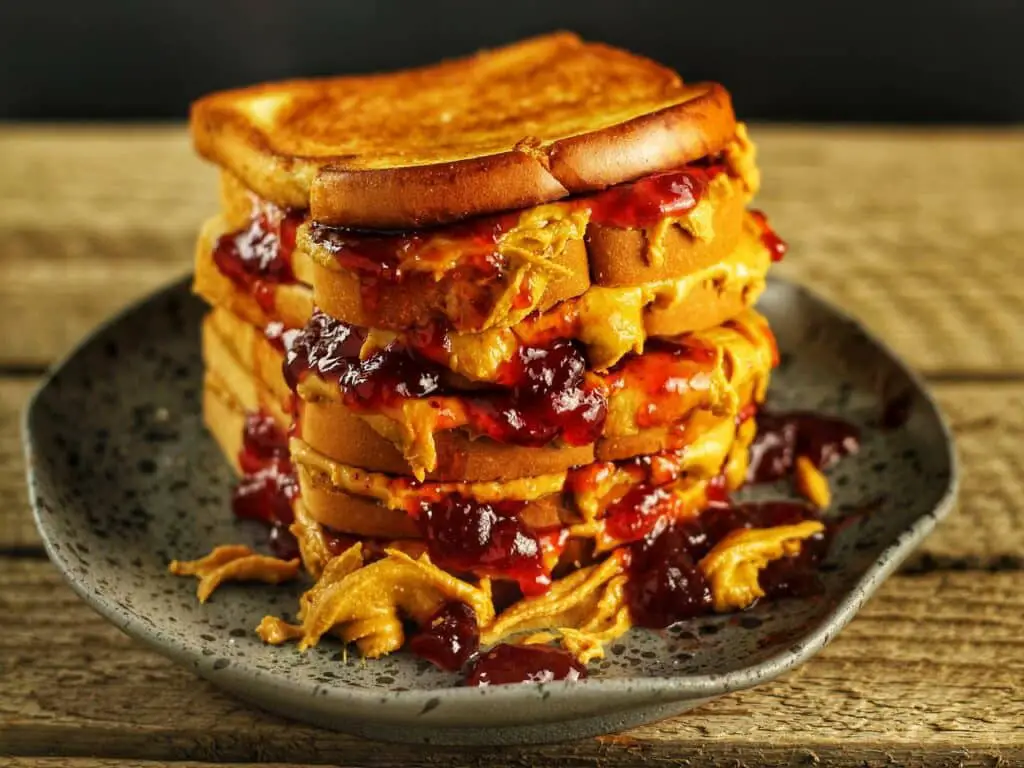Breakfast is never complete without some honey peanut butter to spread on your morning snack.
It is irresistibly sweet, and it’s many people’s favorite.
Dogs are not left out in enjoying some honey peanut butter.
Anytime your fluffy companion finds a chance to munch on it, the tail swings in excitement.
However, as a dog owner, it is important to know that enjoyment doesn’t mean it’s fit for them.
So, can a dog have honey peanut butter?
Yes, dogs can have honey peanut butter but moderately.
It’s a rich source of proteins, niacin, and healthy fat beneficial to dogs.
On the downside, it may contain high-fat content and xylitol, which are harmful to the dog.
This article will look into the health benefits, the risks, and how to serve honey peanut butter.

The Health Benefits of Honey Peanut Butter For Dogs
- Protein
Peanut butter contains protein which helps in their overall growth and development.
Protein is one of the important components of a dog’s diet as it helps build muscles, maintain energy levels, repair body tissues, and strengthen their immune system.
Dog’s body uses protein for growing, maintaining, and repairing tissues.
Growing and active dogs need more protein than older dogs.
The essential amino acids in protein help develop strong bones and muscles, repair body tissue, build antibodies to fight disease, and help maintain energy levels.
- Niacin
It contains Niacin, also known as vitamin B3, an essential nutrient for dogs.
Niacin aids in the production of energy, and it is needed to metabolize fats and carbohydrates.
The vitamin also helps to synthesize amino acids, and it is necessary for the healthy functioning of the nervous system.
Niacin deficiency can result in many problems, including weight loss, seizures, skin depigmentation, and indigestion.
- Healthy fats
Peanut butter has healthy fats that are essential to your dog’s diet.
They provide energy and calories, but they also help transport fat-soluble vitamins A, D, E, and K through the body and aid in the absorption of fat-soluble vitamins.
Essential fatty acids, such as omega-3 and omega-6, are involved in healthy skin and coat development.
Fats can also be stored in the body to be used later as a source of energy.
- Vitamin E
Peanuts contain vitamin E, an essential nutrient for your dog’s health.
It’s a powerful antioxidant that protects cells from the damage caused by free radicals.
Vitamin E also helps dogs’ bodies use other vitamins, such as vitamin K.
Dogs need vitamin E for their nerves, muscles, and red blood cells to function correctly.

When Honey Peanut Butter is Harmful To Your Dog
Honey peanut butter has an array of benefits for your dog.
However, some ingredients would make it harmful.
Always check the ingredients on the package so that you dont expose your pup to health problems.
- When it contains xylitol
If honey peanut butter contains xylitol, it will cause a rapid release of insulin in the dog’s body.
This release of insulin results in low blood sugar (hypoglycemia) within 10-60 minutes after consuming xylitol.
If not treated immediately, the effects of low blood sugar can be severe, causing vomiting, weakness, and seizures; liver failure may also occur several days later.
- Added sugar
Sugar is one of the most harmful ingredients in dog foods.
When the honey peanut butter has additional sugar, it causes obesity, dental problems, and diabetes.
It can also cause allergic reactions, skin infections, and hot spots.
- High-fat content
Some honey peanut butter contains too much fat, which can cause serious health problems for dogs.
It can lead to inflammation of the pancreas, known as pancreatitis.
Vomiting and diarrhea are common symptoms of pancreatitis in dogs.
Fat can also clog arteries, causing problems in blood circulation.
When to Serve Honey Peanut Butter To Your Dog
As a treat
Dogs love honey peanut butter, so they enjoy it when you give it often as a treat.
Give them as a reward for good behavior or spice up training; you will get positive results.
You should occasionally feed treats and other healthy foods for a balanced diet.
The recommended amount of treat in serving is 10%.
Giving medication
If you want to give medication to your dog, it can be difficult, especially if the dog notices.
To make it easier, you can mix the medication in the honey peanut butter or hack your way by giving a spoon or two of peanut butter, then give this as medication.
When you want to bath or groom the dog
Dogs can be distracted easily hence a challenge to bathe and groom them.
You can make it easier by serving a meal containing honey peanut butter.
Its taste is enough distraction to bathe and groom them.
How to Feed Honey Peanut Butter
Feeding your dog honey, peanut butter needs your artistic side to come into play.
After all, it’s a treat, so do it uniquely.
- To add more nutrition, cut slices of bananas or watermelon, then slightly heat honey peanut butter. Mix well until it is evenly spread. Your dog will indeed thank you.
- You can get your dog to work for it by smearing inside bones or toys with holes specially designed for them. It is enjoyable as the dog plays along as it tries to get all the honey peanut butter out.
- For a treat that considers its carnivore nature, smear the honey peanut butter on meat. You can spread it on beef, pork, or chicken. It will be beneficial to the dog and an exciting adventure as well.
Conclusion
Honey peanut butter is safe for dogs, only that you should give them in moderation.
Always check on the ingredients making it.
If it contains toxic contents such as xylitol, high fat, and added sugar, it is advisable not to give it to your dog.
Otherwise, it’s best to make honey peanut butter at home so you can use dog-safe ingredients.
When introducing honey peanut butter to your dog, give small bits, then observe him for any allergic reaction.
If any, discontinue feeding it and go for other healthy treats.
In case of any symptoms of sickness after feeding him with honey peanut butter, consult a veterinary doctor for advice
- What Dog Breeds Have Pink Skin? - March 24, 2023
- What Are the Most Inspiring Dog Breeding Quotes? - March 20, 2023
- Can Pheromone Spray Help Improve Dog Breeding Results? - March 19, 2023








